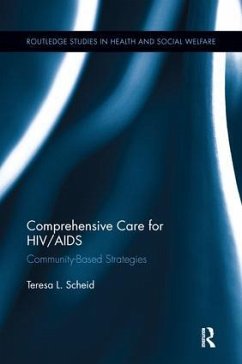
An Ecology of High-Altitude Infancy
A Biocultural Perspective
Versandkostenfrei!
Versandfertig in 1-2 Wochen
50,99 €
inkl. MwSt.
Weitere Ausgaben:

PAYBACK Punkte
25 °P sammeln!
Short description/annotationExamines the low birth weight and infant mortality in high-altitude Indian region Ladakh.Main descriptionAndrea Wiley investigates the ecological, historical, and socio-cultural factors that contribute to the peculiar pattern of infant mortality in Ladakh, a high-altitude region in the western Himalayas of India. Ladakhi newborns are extremely small at birth, smaller than those in other high-altitude populations, smaller still than those in sea level regions. Factors such as hypoxia, dietary patterns, the burden of women's work, gender, infectious diseases, seasonal...
Short description/annotation
Examines the low birth weight and infant mortality in high-altitude Indian region Ladakh.
Main description
Andrea Wiley investigates the ecological, historical, and socio-cultural factors that contribute to the peculiar pattern of infant mortality in Ladakh, a high-altitude region in the western Himalayas of India. Ladakhi newborns are extremely small at birth, smaller than those in other high-altitude populations, smaller still than those in sea level regions. Factors such as hypoxia, dietary patterns, the burden of women's work, gender, infectious diseases, seasonality, and use of local health resources all affect a newborn's birth weight and raise the likelihood of infant mortality. An Ecology of High-Altitude Infancy is unique in that it makes use of the methods of human biology but strongly emphasizes the ethnographic context that gives human biological measures their meaning. It is an example of a new genre of anthropological work: 'ethnographic human biology'.
Table of contents:
1. Introduction; 2. Challenges of high altitude living; 3. Contextualizing reproductive health research in Ladakh; 4. Big mountains, small babies; 5. An ecology of infancy in Ladakh; 6. Comparative perspectives on reproductive health in Ladakh; 7. Toward relevant research: adaptation and policy perspectives on maternal-infant health in Ladakh.
Examines the low birth weight and infant mortality in high-altitude Indian region Ladakh.
Main description
Andrea Wiley investigates the ecological, historical, and socio-cultural factors that contribute to the peculiar pattern of infant mortality in Ladakh, a high-altitude region in the western Himalayas of India. Ladakhi newborns are extremely small at birth, smaller than those in other high-altitude populations, smaller still than those in sea level regions. Factors such as hypoxia, dietary patterns, the burden of women's work, gender, infectious diseases, seasonality, and use of local health resources all affect a newborn's birth weight and raise the likelihood of infant mortality. An Ecology of High-Altitude Infancy is unique in that it makes use of the methods of human biology but strongly emphasizes the ethnographic context that gives human biological measures their meaning. It is an example of a new genre of anthropological work: 'ethnographic human biology'.
Table of contents:
1. Introduction; 2. Challenges of high altitude living; 3. Contextualizing reproductive health research in Ladakh; 4. Big mountains, small babies; 5. An ecology of infancy in Ladakh; 6. Comparative perspectives on reproductive health in Ladakh; 7. Toward relevant research: adaptation and policy perspectives on maternal-infant health in Ladakh.














